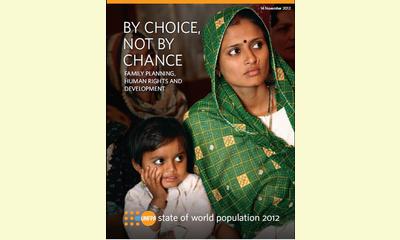|
|
Family Planning, Human Rights and Development
un article par United Nations Population Fund (abridged)
Family planning is a human right. Yet today some 222 million women in developing countries are unable to exercise that right because they lack access to contraceptives, information and quality services or because social and economic forces prevent them from taking advantage of services even where they are available.

click on photo to enlarge
The State of World Population 2012 explains why family planning is a right, examines the challenges in ensuring that all women, men and young people are able to exercise that right and suggests actions that governments and international organizations can take to give everyone the power and the means to decide freely and responsibly how many children to have and when to have them . . .
The State of World Population 2012, drawing on the latest research, calls on developing and developed countries, international organizations and civil society to:
• Radically increase financial support and political commitment to ensuring that rights-based family planning is available to all who want it, when they want it, and that services, supplies and information are of high quality.
• Promote family planning as a right, the exercise of which enables the attainment of a whole range of other rights.
• Integrate voluntary family planning into broader economic and social development because family planning enhances both.
• Eliminate economic, social, logistical and financial obstacles to voluntary family planning so that everyone who chooses to use it has access to it.
• Reduce the number of unintended pregnancies and abortions by increasing availability, reliability and quality of family planning supplies and services.
• Make family planning programmes available to the full range of users, including adolescents, unmarried people, and all others who need it.
• Include emergency contraception in the range of supplies available through family planning
• Engage men and boys in family planning, for their own benefit and to support the right of women and girls to use contraception.
|








|
DISCUSSION
Question(s) liée(s) à cet article:
What is the state of human rights in the world today?,
* * * * *
Commentaire le plus récent:
Each year we get overviews of the state of human rights in the world from Amnesty International and Human Rights Watch.

|
|









